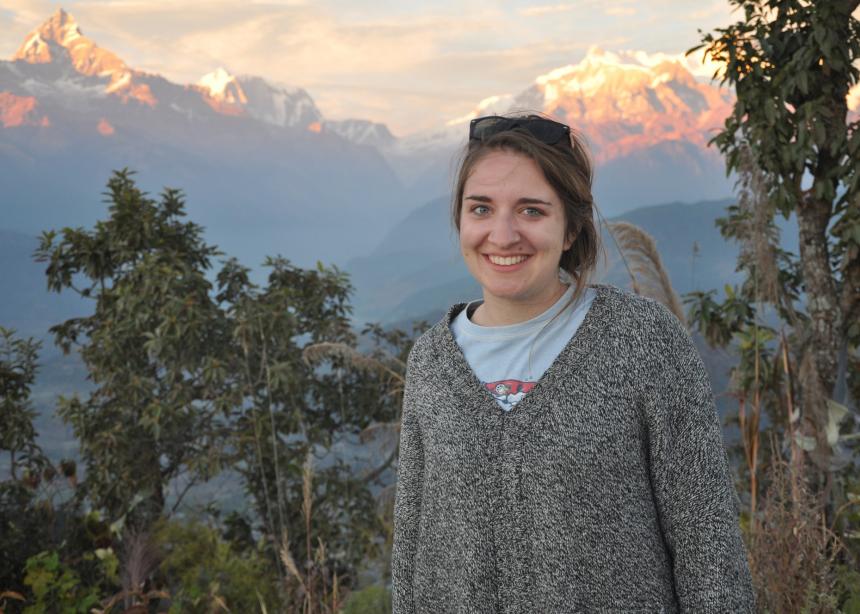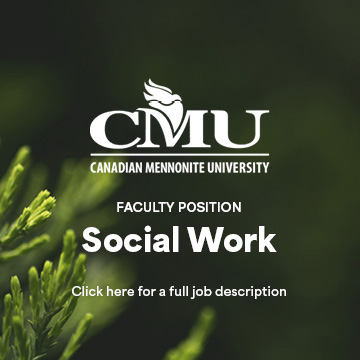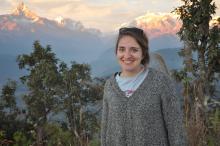Katrina Labun is an MCC SALT participant serving in Kathmandu, Nepal. She shares about her experience following the April 25, 2015, earthquake.
I was with my host family in a church service in Kathmandu when the 7.8-magnitude earthquake struck. At least two hundred people were packed into the meeting hall on the third floor of the church, with perhaps another hundred in the floors below. The pastor was giving a sermon.
Without warning, the building began to shake violently and there was a sound like thunder. Everyone began screaming. Dozens of people raised their arms into the air and screamed, “Prabhu! Prabhu!” which means “Lord! Lord!” I sat rocking back and forth in my chair, holding my host mother with one arm. Out the windows I could see hundreds of birds flying out of the tossing trees and into the air.
When at last it ended, the congregation began to applaud and cheer, “Hallelujah!” My host family and I, along with a stream of others, descended three flights of stairs to stand in the courtyard. The next hour was harrowing. Aftershocks struck frequently, and each time people would scream “Pheri aayo!” (It has come again!)Slowly, reports started to trickle in that people had died and that there was serious damage across the city.
About an hour after the quake, we decided to leave the church and return to our neighbourhood. The streets, intersections and all open places were full of people who were afraid to go inside.
We live in a newer part of town, with stronger buildings, most of which weren’t badly damaged. On reaching my host family’s small, one-storey house, we were relieved to see that it was still standing. But a powerful aftershock scared us back outside about five minutes after we’d gone in to start cleaning up.
We spent the next few hours in a large field nearby with a few hundred other people. After wandering around aimlessly for a while, I heard someone call my name. It was one of my neighbours, approaching me with outstretched hands. She brought me back to where all our neighbours were sitting together on blankets, waiting out the aftershocks. They quickly made room for me and spread another blanket over my lap.
I felt overwhelmed with this simple act of kindness. The blanket itself was a small thing to share, but it represented something more. I thought of holidays I’d celebrated with these people, of cups of tea we’d drank together. I was struck by how beautiful it was to have neighbours, to go through life together in good times and bad, to look out for each other. Living in community means sharing more than just blankets and cups of tea; it means sharing your lives.
The days after the quake were emotional and difficult. Many people had experiences far more harrowing than mine, and many lost homes, friends and relatives. So far, though, communities have been brought together by the earth’s coming apart.
Kathmandu is home to many religions, cultures, languages and ethnicities, and prejudice often keeps people apart from each other. But in the midst of this disaster we have been reminded of what unites rather than what divides us. Communities have taken shelter together under tarps and tents. People have demonstrated extraordinary depths of generosity and compassion, helping their neighbours however they can. Everyone has a story about where they were at the time of the earthquake, and everyone wants to talk about it. Conversations, even with complete strangers, have become deeply felt and personal.
I don’t mean to say that this earthquake has actually been a good thing. Demonstrations of community spirit don’t alter the fact that the earthquake was horrible and terrifying and that the country has been devastated. But seeing the way people have banded together, I feel encouraged and hopeful for the future. I’m in awe of the courage and resilience of my neighbours and of my host family’s determination to keep going with what was already a difficult life. And, while I’ll always remember the earthquake and the many awful moments that followed, I’ll also remember my neighbour coming towards me, calling my name and offering me her blanket to sit on and her hand to hold.
See also:
MCC begins response to Nepal earthquake
By tractor, truck, foot—supplies reach rural Nepal







Add new comment
Canadian Mennonite invites comments and encourages constructive discussion about our content. Actual full names (first and last) are required. Comments are moderated and may be edited. They will not appear online until approved and will be posted during business hours. Some comments may be reproduced in print.